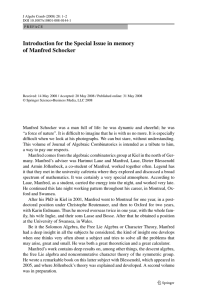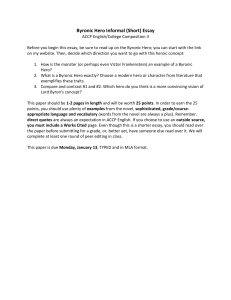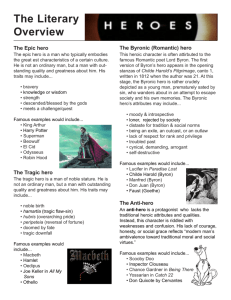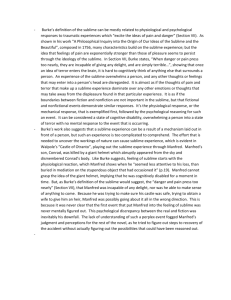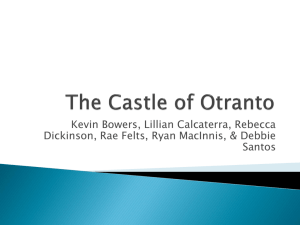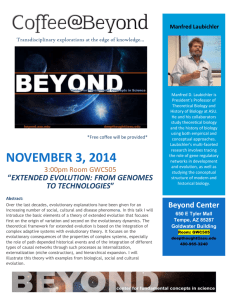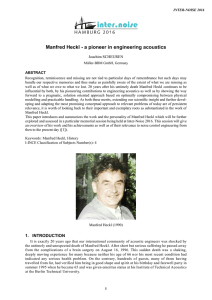Lord Byron
advertisement
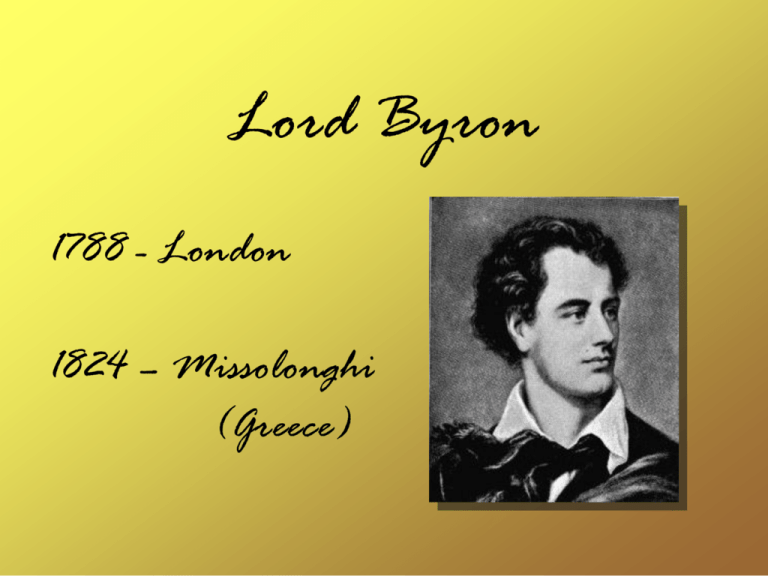
Lord Byron 1788 - London 1824 – Missolonghi (Greece) Life Youth The Grand Tour Adulthoo d 1809: as many young aristocratics did atwoman, that time, His mother, by turns a violent and sweet His egotistical behaviour and his incestuous relationship work was a success: “I awoke one morning and George Byron set out on a journey to Spain, Malta, moulded his tempestous character. made unpleasant hisliked friends, so loved in 1816 left foundhim myself famous”.toHe it and tohe create Greece and Middle East. England started wandering an air of and mystery about himself.about the Continent. He started composing poems at twelve years old and As he returned (1812) he published two cantos of inIn 1807 he published his first collections. 1823 he took part to the Greek indipendence war Childe Harold's inawhich against the TurksPilgrimage, but died for fever he thedescribes following Several parts of Europe always reminding the reader year. of their remote and recent historical associations. Profile His works were translated intovein many but he became Byron represents the satirical of languages English Romanticism; even his mysterious adventurous life: In hismore mostfamous famousfor satire, Don Juan, and the travel is an excuse his melancholy and sexual extravagances concurred to to satirize the social conditions of contemporary England embody the figure of the romantic dandy. and the contemporary society in general. His politic ideas of equal rights and social reforms brought him to join the “carbonary”movement in Italy and the Greek Indipendence war. In a word, he became a myth. The Byronic Hero “The Byronic Hero was the brooding and defiant romantic Character who emerged from Lord Byron's finest works, Mysterious withManfred, Manfred's Unknown past Child Harold'scharacter Pilgrimage, Don Juan” Grolier Enciclopaedia a mysterious past Will to escape from the past, His mysterious guilt due to a sense of guilt Travel lover has some typicalDon Juan's travels This character features which can easily Supernatural The seven spirits M. invokes be identifyed inforces his works: He's an outcast, a superior Manfred lives alone in the man who doesn't share castle, refuses human common's people destiny contact and every sort of submission Byron – Byronic Hero This is a comparison between some features of the Byronic Hero and Byron himself: Mysterious character with a mysterious past Will to escape from the past, due to a sense of guilt Travel lover Supernatural forces He's an outcast, a superior man who doesn't share common's people destiny He loved to keep his life mysterious He had a tempestuous past (his mother, incestuous rel.) He travelled a lot His egotistical behaviour separated him from his friends Manfred Manfred in a Gothic castlein the Alps. Tortured by his own sense of guilt, Manfred invokes six spirits associated with earth and the elements, and a seventh who determines Manfred's personal destiny. None of the spirits are able to grant him what he wishes, the forgetfulness and oblivion he seeks. Manfred falls into a state of unconsciousness during which an unidentified voice (probably his own conscience) tells him that he will be tortured by his own nature. Although he will seek death, his wish will be denied. So Manfred attempts suicide from the high cliffs of the Jungfrau, but he is rescued by an elderly Chamois Hunter who takes him back to his cabin and offers him a cup of wine. Manfred imagines that the cup has blood on its brim, Astarte's blood, which is also his own blood (incestuous relationship). Manfred invokes the Witch of the Alps, who offers to help him on condition that he swear obedience to her. Manfred refuses to be her slave: he's unwilling to submit to any external authority. Astarte appears to him again and predicts that his “earthly ills” will soon come to an end. Manfred returns to his castle feeling peaceful, if only for a short time. He is visited by the Abbot of St. Maurice who offers comfort through religion. Manfred refuses, although he takes the hand of the Abbott at the moment of death, finally accepting the human contact he had refused during life. All Manfred's themes are linked to the Byronic Hero's features: Mysterious past Sense of guilt Supernatural elements He's an outcast The End
